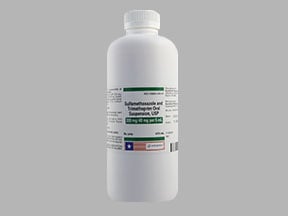
Sulfatrim Pediatric Coupons & Savings Card – Discount Prices from $8.94
Brand for: Sulfamethoxazole-trimethoprim
My prescription
Edit
100ML of 200-40MG/5ML, Sulfamethoxazole-trimethoprim (1 Bottle)
Select pharmacy

CVS
$21.20
COUPON PRICE
Walmart
$8.94
COUPON PRICE
Walgreens
$14.64
COUPON PRICE
Albertsons
$18.42
COUPON PRICESulfatrim Pediatric savings card
Show this card to your pharmacist
Walmart
$8.94
BIN
ID
PCN
GRP
019876
LH3E013CBC
CHIPPO
LHX
Powered by
Price history for Sulfatrim Pediatric (brand) & Sulfamethoxazole-trimethoprim (generic)
1 Bottle, 10ML of 200-40MG/5ML
Average retail price for Sulfatrim Pediatric
Average retail price for Sulfamethoxazole-trimethoprim
Average SaveHealth price for Sulfamethoxazole-trimethoprim
Our price history data is based on aggregated prescription data collected from participating pharmacies in America. Our prescription data updates daily to reflect the latest price changes. If you notice a missing data point, it means there wasn't sufficient data available to generate a monetary value for that date.
Over the last 12 months, the average discount price of Sulfatrim Pediatric is $17.63 using the SaveHealth savings card. That's an average savings of 90.73% on Sulfatrim Pediatric with our discount card.
*Retail prices are based on pharmacy claims data, and may not be accurate when we don't have enough claims.
Sulfatrim Pediatric (Sulfamethoxazole-trimethoprim) dosage forms
Dosage Quantity Price from Per unit 10ML of 200-40MG/5ML 1 Cup $3.14 $3.14 10ML of 200-40MG/5ML 2 Cups $3.79 $1.90 10ML of 200-40MG/5ML 3 Cups $4.43 $1.48
| Dosage | Quantity | Price from | Per unit |
|---|---|---|---|
| 10ML of 200-40MG/5ML | 1 Cup | $3.14 | $3.14 |
| 10ML of 200-40MG/5ML | 2 Cups | $3.79 | $1.90 |
| 10ML of 200-40MG/5ML | 3 Cups | $4.43 | $1.48 |
What bacteria does Sulfatrim treat?
Sulfatrim is commonly used to treat infections caused by certain types of bacteria, including Escherichia coli, Klebsiella pneumoniae, Enterobacter species, Haemophilus influenzae, and Streptococcus pneumoniae. It is also effective against Staphylococcus aureus and some strains of Proteus mirabilis.
Do you have to refrigerate Sulfatrim pediatric suspension?
Sulfatrim pediatric suspension does not need to be refrigerated. It should be stored at room temperature, away from light and moisture. It is important to keep it in a tightly closed container and out of reach of children.
What is Sulfatrim pediatric suspension used for?
Sulfatrim pediatric suspension is used to treat bacterial infections in children. It is commonly prescribed for conditions such as urinary tract infections, middle ear infections (otitis media), and certain types of respiratory infections. It contains a combination of sulfamethoxazole and trimethoprim, which work together to inhibit the growth of bacteria.
Are Sulfatrim and Bactrim the same?
Yes, Sulfatrim and Bactrim are brand names for the same combination antibiotic, which contains sulfamethoxazole and trimethoprim. They are used to treat similar types of bacterial infections.
What to avoid while taking Sulfatrim?
While taking Sulfatrim, it is advisable to avoid the following:1. Alcohol: It may increase the risk of certain side effects.2. Sunlight or UV exposure: Sulfatrim can make the skin more sensitive to sunlight, increasing the risk of sunburn. It's recommended to use sunscreen and wear protective clothing.3. Certain medications: Some drugs may interact with Sulfatrim, such as blood thinners, certain diuretics, and other antibiotics. It's important to inform the healthcare provider of all medications being taken.4. Foods or supplements high in potassium: Sulfatrim can increase potassium levels, so it's best to monitor intake of high-potassium foods and supplements.5. Skipping doses: To ensure effectiveness, it's important to take the medication as prescribed and not skip doses.Patients should always consult their healthcare provider for personalized advice and guidance.
